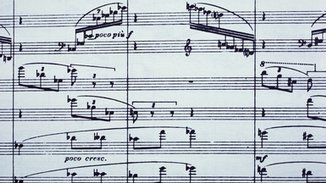


Repetitive Sounds Are Music to the Brain
重复的声音对大脑来说就是音乐
Repeating something can render that thing melodious—even the sound of a shovel being dragged across the pavement. Karen Hopkin reports.
重复某种声音可以使其变得有音乐性——即使是在人行道上拖动铁锹的声音。凯伦·霍普金报道。
撰稿/播音:凯伦·霍普金(Karen Hopkin)
翻译:姜帆
审校:潘磊
Music includes a lot of repetition. What would your favorite song be without a chorus? But the connection runs even deeper than that. Because the very act of repeating something can render that thing melodious—even the sound of a shovel being dragged across the pavement. That’s according to a study to be published soon in the journal Music & Science. [Rhimmon Simchy-Gross and Elizabeth Hellmuth Margulis, The Sound-to-Music Illusion: Repetition Can Musicalize Non-Speech Sounds, in press]
音乐中包括很多重复。你最喜欢的歌曲如果没有了副歌会变成什么样子?还有更深层的联系。因为恰好的对某种声音的重复可以使其变得有音乐性——即使是在人行道上拖动铁锹的声音。
A few years back, psychologists at the University of California, San Diego, discovered that when words or phrases are repeated a few times, they can start to sound more like singing than speaking.
几年前,加州大学圣地亚哥分校的心理学家发现当单词或短语被重复几次时,它们渐渐听起来更像是在唱歌而不是说话。
<<“The sounds as they appear to you are not only different from those that are really present, but they sometimes behave so strangely as to seem quite impossible. But they sometimes behave so strangely. Sometimes behave so strangely. Sometimes behave so strangely. So strangely. So strangely. So strangely. So strangely.” Credit: speech to song illusion/Deutsch>>
<“这些声音如你听到的,不仅不同于那些真正存在的声音,有时候还表现的很奇怪,以至于听起来非常不可思议。但是它们有时表现得如此奇怪。有时表现得如此奇怪。有时表现得如此奇怪。如此奇怪。如此奇怪。如此奇怪。如此奇怪。”来源:言语成为音乐的幻觉/多伊奇>
注:一段重复带来音律的示范
The effect is perhaps not entirely surprising. Talking and singing are both forms of vocal communication. But researchers got to wondering: could repetition also musicalize other types of sounds?
这种效果或许不会让你那么惊讶。说话和唱歌都是口头交流的一种形式。但是研究者们产生疑问:重复是否也能使其它类型的声音音乐化?
So they collected clips of 20 different environmental sounds…including water dripping, ice cracking, whales calling, and the aforementioned shovel. And they played the snippets to 58 undergraduates…first, as single sounds <
他们为此收集了20种不同的环境声音片段,包括水滴落的声音,冰碎裂的声音,鲸鱼的叫声和前面提到的铁锹声。然后,他们向58名本科生播放了这些片段…首先,播放一片段的声音<鲸鱼的叫声>,然后再播放一系列重复次数增加的片段<鲸鱼重复的叫声>。
What they found is that…as the repeats stacked up…the participants rated the sounds as being more tuneful.
他们发现,当重复次数增加,参与者们认为这些声音更加悦耳。
The conclusion:
“Repetition’s power to musicalize seems to extend to a broader variety of sounds than just speech.”
结论:
“利用重复实现音乐化的效果似乎可以扩展到更广的声音范畴,而不仅仅是语言。”
Elizabeth Margulis, director of the music cognition lab at the University of Arkansas, who led the study.
阿肯色大学音乐认知实验室主任伊丽莎白·马古利斯(Elizabeth Margulis)负责这项研究。
“These perceptual transformations are powerful because nothing changes in the acoustic signal itself. That is held fixed. Everything that sounds different comes from the mind itself, making these illusions particularly useful for understanding the musical mode of listening. What are we doing when we’re hearing something musically? How is this different from other kinds of hearing? These transformations allow us to tackle these kinds of questions head on.”
“这些感知转换是强大的,因为声音信号本身没有任何变化。那是不可变的。所有听起来不同的东西都来自于思维本身,这使得这些猜想对于理解听觉的音乐模式特别有用。如果我们听到一些有音乐性的声音,我们的大脑在做什么?这与其他类型的听有多不同?这些感知转换的研究成果使我们能够正面解决这些问题。”
<
<重复的冰碎裂的声音>
—Karen Hopkin
京ICP备11000850号-1  京公网安备11010502039775号
信息网络传播视听节目许可证0111611号
国家科技基础条件平台
京公网安备11010502039775号
信息网络传播视听节目许可证0111611号
国家科技基础条件平台
© 2011-2022 版权所有:中国数字科技馆 未经书面许可任何人不得复制或镜像

 京公网安备11010502039775号
京公网安备11010502039775号 


